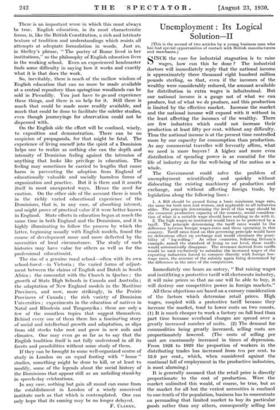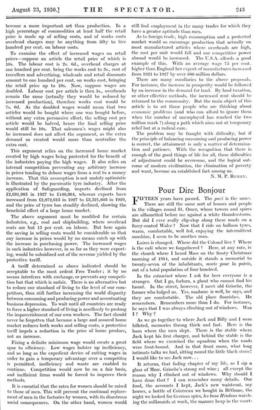Unemployment : Its Logical Solution—II
[This is the second of two articles by a young business man who has had special opportunities of contact with British manufacturers and merchants.) SCE the cure for industrial stagnation is to raise wages, how can this be done ? The industrial doctors will immediately reply that the national income is approximately three thousand eight hundred million pounds sterling, so that, even if the incomes of the wealthy were considerably reduced, the amount available for distribution in extra wages - is infinitesimal. But our national income is a gauge not of what we can produce, but of what we do produce, and this production is limited by the effective market. Increase the market and the national income will expand with it without in the least affecting the incomes of the wealthy. There are few industries which could not increase their' production at least fifty per cent. without any difficulty. Thus the national income is at the present time controlled more by our capacity for consumption than production. As any commercial traveller will fervently affirm, what we need is more buyers A higher and more even distribution of spending power is as essential for the life of industry as for the well-being of the nation as a whole.
The Government could solve the problem of unemployment scientifically and quickly without dislocating the existing machinery of production and exchange, and without affecting foreign trade, by legislation along the following lines :
1. A Bill should he passed fixing a basic minimum wage rate, the same for both men and women, and applicable to all industries alike. The principle determining the level of this wage should he the economic productive capacity of the country, social considera- tion of what is a suitable wage should have nothing to do with it.
2. The high wages so instituted would have to be protected by a tariff. The principle determining the tariff rates would be the difference between foreign wages-rates and those operating in this country. Tariff rates fixed on this governing principle would have no deleterious effect on exchange and would eliminate the possi- bility of log-rolling." As other countries, following Britain's example, raised the standard of living to our level, these tariffs would automatically disappear. The revenues derived from tariffs would be used exclusively to subsidize the increased wages of the exporting industries forced to compete directly with foreign low- wage rates, the amount of the subsidy again being determined by the difference in the rates of the competitors.
Immediately one hears an outcry, " But raising wages and instituting a protective tariff will electrocute industry, it will raise prices so that no one will be able to buy, it will destroy our competitive power in foreign markets."
All these objections are based on a cursory consideration of the factors which determine retail prices. High wages, coupled with a protective tariff because they increase the market, tend to lower costs on two counts. (1) It is much cheaper to work a factory on full load than part time because overhead charges arc spread over a greatly increased number of units. (2) The demand for commodities being greatly increased, selling costs are proportionately lowered. (The costs of selling per unit are enormously increased in times of depression. From 1928 to 1929 the proportion of workers in the distributing trades has increased from ten per cent. to 13.9 per cent., which, when considered against the continual fall of employment in the productive industries, is most alarming.) It is generally assumed that the retail price is directly proportionate to the cost of production. Were the market unlimited this would, of course, be true, but as the market for all but the veriest necessities is confined to one-tenth of the population, business has to concentrate on persuading that limited market to buy its particular goods rather than any others, consequently selling has become a more important art than production. In a high percentage of commodities at least half the retail price is made up of selling costs, and of works costs overhead charges may be anything from fifty to five hundred per cent. on labour costs.
To examine the effect of increased wages on retail prices—suppose an article the retail price of which is 10s. The labour cost is 2s. 6d., overhead charges at one hundred per cent. bring the works cost to 5s., cost of travellers and advertising, wholesale and retail discounts amount to one hundred per cent. on works cost, bringing the retail price up to 10s. Now, suppose wages are doubled. Labour cost per article is then 5s., overheads remain the same (actually they would be reduced by increased production), therefore works cost would be 7s. 6d. As the doubled wages would mean that two articles would be bought where one was bought before, without any extra persuasive effort, the selling cost per article would be halved, hence the final selling price would still be 10s. That salesmen's wages might also be increased does not affect the argument, as the extra demand so created would more than neutralize the extra cost.
This argument relies on the increased home market created by high wages being protected for the benefit of the industries paying the high wages. It also relies on internal competition preventing any arbitrary increase in prices tending to debase wages from a real to a money increase. That this assumption is not unduly optimistic is illustrated by the pneumatic tyre industry. After the application of Safeguarding, imports declined from £2,631,985 in 1927. to £440,304, whereas exports have increased from £2,872,615 in 1927 to £3,521,603 in 1929, and the price of tyres has steadily declined, showing the beneficial effect of a large home market.
The above argument must be modified for certain industries, e.g., coal and shipbuilding, where overhead costs are but 15 per cent. on labour. But here again the saving in selling costs would be considerable so that any increase in prices would by no means catch up with the increase in purchasing power. The increased wages in such industries however, in so far as they were export- ing, would be subsidized out of the revenue yielded by the protective tariff.
A tariff determined as above indicated should be acceptable to the most ardent Free Trader ; it by no means interferes with exchange, or prevents any competi- tion but that which is unfair. There is no alternative but to reduce our standard of living to the level of our com- petitors, thus still further increasing the world disparity between consuming and producing power and accentuating business depression. To wait until all countries are ready to force a higher standard of living is needlessly to prolong the impoverishment of our own workers. The fact should Dever be forgotten that because a large and assured home market reduces both works and selling costs, a protective tariff impels a reduction in the price of home produce, not an increase.
Fixing a definite minimum wage would create a great spur to efficiency. Low wages bolster up inefficiency, and so long as the expedient device of cutting wages in order to gain a temporary advantage over a competitor is permitted, inefficiency and waste are enabled to continue. Competition would now be on a fair basis, and inefficient firms would be forced to improve their methods.
It is essential that the rates for women should be raised to those of men. This will prevent the continual replace- ment of men in the factories by women, with its disastrous social consequences. On the other hand, women would still find employment in the many trades for which they have a greater aptitude than men.
As to foreign trade, high consumption and a protected market would so encourage production that actually on most manufactured articles where overheads arc high, the cost per unit would fall and our competitive power abroad would be increased. The U.S.A. affords a good example of this. With an average wage 75 per cent. higher than England her export of manufactures increased from 1921 to 1927 by over 380 million dollars.
There are many corollaries to the above proposals. For instance, the increase in prosperity would be followed by an increase in the demand for land. By land taxation, or other effective methods, the increased rent should be returned to the community. But the main object of this article is to set those people who are thinking about economic problems (and who can afford to ignore them when the number of unemployed has reached the two million mark ?) along a path which aims not at temporary relief but at a radical cure.
The problem may be fraught with difficulty, but if the principle of balancing consuming and producing power is correct, the attainment is only a matter of determina- tion and patience. With the recognition that there is enough of the good things of life for all, these difficulties of adjustment could be overcome, and the logical out- come of modern civilization, the elimination of poverty and want, become an established fact among us.
N. M. P. REILLY.

































 Previous page
Previous page